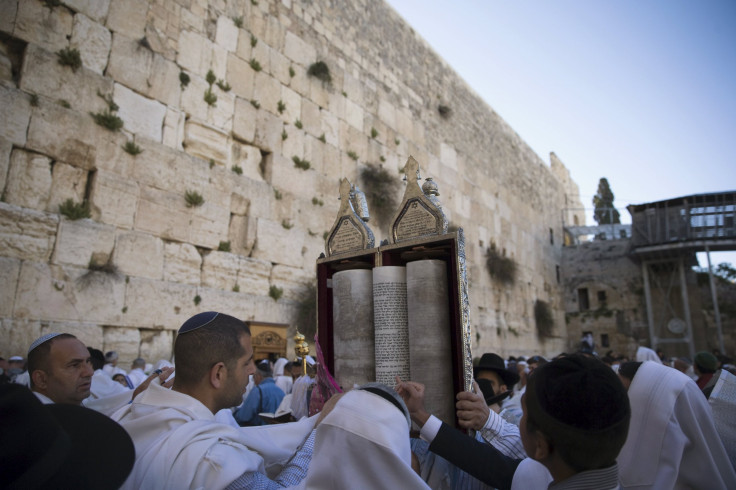Who Are The Kohanim? Jewish Priestly Caste Perform Passover Blessings At Western Wall

Jerusalem’s Western Wall played host to a ritual that dates back to biblical times as tens of thousands of people gathered at the Jewish holy site Monday for the traditional priestly blessing, known in Hebrew as Birkat Kohanim. The ritual is a significant part of the eight-day Passover observance in Israel, and crowds gather at the site annually to receive the blessing from hundreds of members of Judaism’s priestly caste, or kohanim.
The kohanim have a special status in Jewish tradition and are believed to have been descended from the original priests of the Jewish temple in Jerusalem, the site of what is now known as the Temple Mount. Tradition holds these priests are of the direct line of Aaron, Moses’ brother, who is considered to be the first kohen, or priest. According to biblical scriptures, God directed Moses to appoint Aaron and his four sons to serve as the first priests of the Israelites while their descendants were also bestowed with the honor in perpetuity.
Prior to the Roman destruction of the temple in Jerusalem in 70 A.D., there were stringent requirements on admittance to the priesthood, which only allowed those who could provide rigorous proof of their descent from Aaron. Because this process of verification became impossible in the wake of the temple’s destruction, in later years the mere fact of a family’s traditional belief in their kohanim lineage was considered enough to establish them as such. The Jewish family name Cohen -- and variations on the spelling -- is also thought to denote membership to the priestly caste.
Because of their lineage, kohanim hold the highest religious status in Jewish society and have the privilege of being the first to say a blessing on the Torah during religious services, among other religious honors. However, a number of restrictions are also placed on kohanim, who are forbidden from coming into contact with dead bodies, including by attending funerals, or marrying divorcees or converts.
Kohanim began participating in the priestly blessing at the Western Wall in 1970 after Jerusalem Rabbi Menachem Mendel Gafner began holding the ceremony as a public event in the aftermath of Israel’s 1967 war with its Arab neighbors.
More than 75,000 hear Birkat Kohanim, the daily blessing uttered in the Holy Temple http://t.co/W1RaUMswIC pic.twitter.com/GGVjmDjCdL
- Temple Institute (@TempleInstitute) April 6, 2015At least 50,000 people gathered Monday for the Birkat Kohanim at the Temple Mount, though some estimates placed the numbers as high as 75,000. Hundreds of kohanim draped in their traditional white prayer shawls led the ceremony, reciting words from the biblical book of Numbers. The ceremony comes on the third day of Passover, which commemorates the Israelites’ escape from slavery. The holiday is one of three pilgrimage festivals during which Jews traditionally visit Jerusalem.
© Copyright IBTimes 2025. All rights reserved.






















